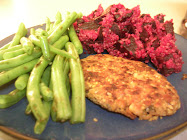A woman with celiac's disease goes into a restaurant to eat and explains that she needs a gluten free meal. She orders a salad without crutons and explains how sensitive she is to food that is cross contaminated with gluten... but the overworked, slightly annoyed waiter with tired feet just goes back to the kitchen and picks up a pre-made salad, tossing the crutons into the trash on the way back to the table. The woman eats this "gluton free" salad and breaks out in a rash later that night.
A man who has chosen to follow a strictly vegan diet because of his political and moral beliefs is invited to celebrate his grandfather's birthday at a local steak house. The man calls ahead, explains his dietary preferences, and asks the restaurant if they can accommodate him. The restaurant understands and wanting to increase business agrees to do what they can. The night of the celebration the vegan man arrives, introduces himself to the waitress and is greeted with annoyance and irritation. The chef had to go out of her way and the waitress is bothered by "picky" customers. The man is served cold food and treated poorly because he was "difficult."
In both of these situations the diner has a difficult time eating in a restaurant, and the restaurant staff is annoyed by the specific requests and added hassle of meeting the diner's needs. The difference is that the first situation involves an innate dietary restriction while the second one is a chosen lifestyle. The question is... is there a difference? Should people who choose to restrict their diet based on different belief systems have a harder time doing that than people who are required to eat differently than the majority of the population?
Personal anecdotes:
I ate at my favorite brewery recently and I wanted to share the chili cheese fries with my brother who was visiting from out of town (for all you non-New Mexicans - chili cheese fries out here have a green chili pepper sauce on them, not the red bean and beef sauce that other parts of the country call chili). I know that most places make their chili sauce with a little bit of pork so I asked if the brewery had any vegetarian chili sauces. They didn't, but the waitress was super friendly, talked to the kitchen, and came back with a few suggestions that worked out very nicely. The vegetarian "chili" fries were quite tasty. Even though my dietary restrictions are voluntary, in this case I felt they were respected.
On the other hand... I was recently invited to an Easter dinner with a close friend and his family. I made sure that my friend let his family know that I was a vegetarian in advance and I offered to bring something to contribute to the meal. The situation seemed ok, but I received an email about the menu where my friend felt the need to inform me that the meat was really going to be very high quality, free range, natural meat. When I replied saying that I was indeed going to be eating vegetarian, he seemed surprised. I don't tell this story to pick on my friend or insinuate that he was being insensitive - I know he had valid reasons for giving me this information and questioning what I would do - but this situation does make it clear that there is a difference between how chosen diets are perceived versus compulsory ones. My friend never would have asked his uncle, who has a gluten allergy, if he was absolutely sure he didn't want any of the delicious bread.
The question becomes, should there be a difference in how dietary restrictions are accepted and respected? Does it make a difference if it is chosen versus innate? Am I more responsible for the inconvenience my vegetarianism causes because I chose it... or should my choice be respected as a black and white, no-meat type of issue?
I'm sure that we can think of some parallels to draw in this situation. We'll come back to these questions.
Subscribe to:
Post Comments (Atom)







No comments:
Post a Comment